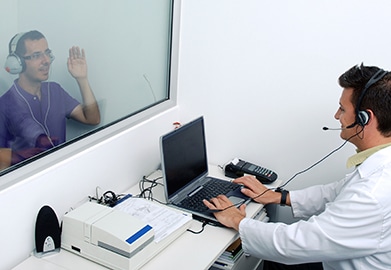When Should You Visit a Hearing Centre?


The Canadian Health Measures Survey for 2012 to 2015 shows that 40% of adults between 20 and 79 experience at least slight hearing loss. This number continues to grow each year, as the World Health Organization projects that one in four people will experience some degree of hearing loss by the year 2050. With these startling statistics, many people may wonder how often they should visit a hearing centre for an exam.
For most, you need to get your ears checked when you notice a problem. For instance, if you experience pain and ringing in your ears or occasionally find yourself straining to hear, it is time to visit a hearing clinic.
Should you still visit even if your hearing seems fine? In certain situations, yes. Here are some instances when a visit to a hearing centre would be important.
Hearing Loss Harms Your Quality of Life
Untreated hearing loss can reduce your quality of life and negatively impact your brain health. Many studies have indicated that people with hearing loss are highly likely to develop anxiety, feelings of inadequacy, and depression. They also tend to avoid social situations, making them feel lonely and isolated.
Our society tends to dismiss minor hearing loss as harmless. However, it affects almost every facet of your life. This makes it essential to visit a specialist for early detection and treatment at the first signs of hearing loss.
Baseline Testing
Many adults have never visited a specialist for a hearing test. Of this group, women were less likely than men to have gotten their hearing tested. If you are among those who have not, it is recommended that you schedule an appointment to understand your hearing abilities and check the health of your ears.
Depending on your results or risk factors, your hearing specialist may want to conduct a test annually. A baseline test indicates your hearing levels at that point, allowing the specialist to see how it changes over time and recommend an appropriate treatment option.
Even if you do not notice hearing loss, getting routine baseline testing is recommended so you can catch any issues early.
Hearing Screening
A hearing screening differs from an all-inclusive hearing test. It is a quick test to determine if you need further examination.
If you pass, it is unlikely that you have hearing loss. However, if you fail, you should meet with a specialist at a hearing centre to get a detailed evaluation. This will help identify the type of hearing loss, severity, and best treatment.
Hearing loss may occur throughout any stage of your life, but the risk increases with age. Unless the issues are quite noticeable, many individuals do not know they have hearing loss until they are screened.
Causes of Hearing Loss
There are many unique factors that generally cause hearing loss. Moreover, causes vary depending on the type of hearing loss.
- Sensorineural is the most prevalent type of hearing loss, resulting from ageing, injury, exposure to loud noise, certain drugs, disease, or infection.
- Conductive hearing loss occurs when sound is blocked in the middle or outer ear. This is often a physical cause, such as a foreign object, damaged eardrum, fluid buildup, or bone stiffness. These blockages prevent sound from being fully transmitted to the inner ear.
Sometimes, you may have a combination of both conductive and sensorineural hearing loss. A hearing test will help determine the best solution for you.
Other common causes of hearing loss in adults include:
- Hereditary factors
- Inflammation of your ear’s external auditory canal
- Circulatory problems like high blood pressure
- Otosclerosis (affects the three tiny bones in your ears causing abnormal bone growth)
- A cholesteatoma (an abnormal growth or cyst that develops in the middle ear, behind the eardrum)
Signs of Infection
The most prevalent sign is difficulty hearing, but there are more signs. You should visit a hearing centre if you experience the following along with hearing troubles:
- Feeling unwell
- High temperature
- Lack energy
- Pain in the ear
- Discharge or blood leaking from the ear
- Scaly skin in or around the ear
- Itchiness or irritation in or around your ear
Hearing Aids Need to be Checked Too
Hearing aids remain beneficial for a span of three to seven years. The timeline varies if you have cochlear imbeds or a bone-anchored hearing aid. If your hearing loss progresses quickly in this timeframe, your hearing aids are most likely outdated. Other variables affecting the lifespan include the quality of the device, maintenance, and how much wear and tear it undergoes while in use.
Hearing aids need specialized care to ensure they function optimally. If you are having difficulties with them, visit your local hearing centre to have them tested. They will be able to recommend the best course of action, such as a repair or replacement.
When you get your devices for the first time, ask your hearing specialist how often you should bring them in for testing. If your hearing loss has stabilized, they may suggest a less frequent testing schedule than someone experiencing progressive hearing loss.
Bravo Hearing Can Help You Find the Perfect Solution
At Bravo Hearing, we understand that hearing loss can be a tricky experience. If you suspect that you or a loved one are suffering from some degree of hearing loss, reach out to a hearing specialist at our clinic.
We have professional hearing professionals to help you with hearing problems, hearing tests and hearing aids dispensing and repairs. We also offer expert comprehensive assessments and advice based on the truths of working and living with hearing problems. We want to ensure that you never feel alone, which is why we provide a variety of support options.
Contact us today by filling in our online inquiry form. You may also call us at 416-207-9711 for more information or to book a hearing test.
Also Read:


